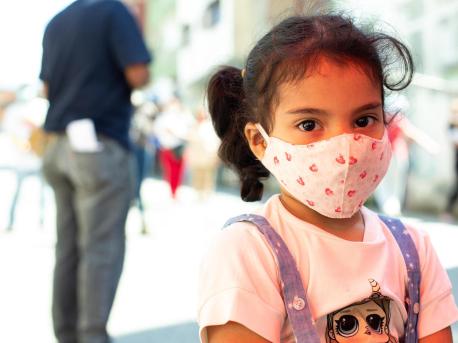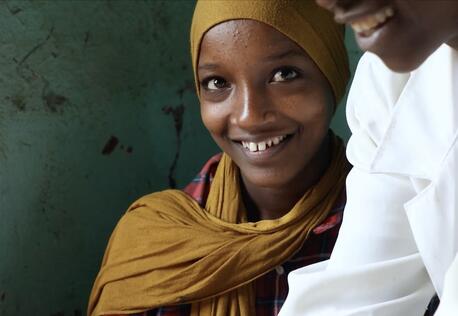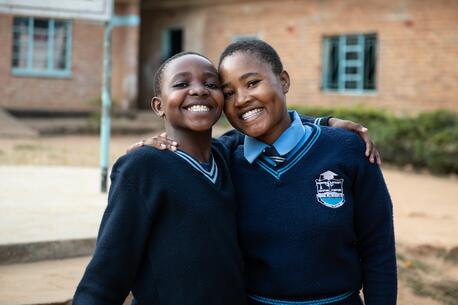
Protecting Children's Mental Health in Venezuela During the Pandemic
The COVID-19 pandemic is just the latest challenge for families in Venezuela, where political unrest and spiralling inflation were already a fact of life. Venezuela's humanitarian and economic crisis has pushed more than 5 million people to leave the country.
UNICEF child protection officers are providing mental health services and psychosocial support to help children and families in Venezuela cope in an increasingly difficult time. Community outreach workers fan out into the countryside, distributing violence prevention information and identifying children in need of services. Case workers meet with families to resolve disputes and connect them with vital resources. And at the border, counselors meet with some of the more than 100,000 returning Venezuelans, helping them get the support they need to keep their families safe.

In Venezuela's Bolívar State, UNICEF-supported community health promoters like Roberto Cordero (above) visit families in rural areas to share health and hygiene information and identify children in need of services, including nutrition screening and mental health counseling. The information includes instructions on stopping the spread of COVID-19, gender-based violence prevention, and other resources to help families endure the tensions of life during the lockdown. © UNICEF/UNI357580/Urdaneta

In Venezuela's Táchira State, UNICEF-supported child protection specialists Nancy Ibarra (above, center) and María José see about six cases a day. The two young chldren above came to their office when their caregivers requested support for family conflict resolution. The counselors offer legal guidance and any necessary advice to protect the rights of children and adolescents. © UNICEF/UNI357931/Poveda
Children have been the undeserved target of adult frustration and stress as a result of the pandemic situation. — Maria José, child and adolescent protection counselor in Táchira State, Venezuela
"Due to the COVID-19 situation, we are more active than ever, 24 hours a day," says Maria José, who has been assisting the Child and Adolescent Protection Council of the city of San Cristóbal in Táchira for the past year and a half. "Children have been the undeserved target of adult frustration and stress as a result of the pandemic situation, which involves mothers, fathers and family members living under the same roof 24 hours a day, in addition to the situation that already existed in the country."

"Since the beginning of the pandemic, we started to receive more cases of family violence than had ever been reported before," notes Ibarra, who has been a child and adolescent protection counselor in Táchira State, which borders on Colombia, for five years. "Additionally, with the installation of the Comprehensive Social Assistance Points on the border, we had to adapt our work plan to provide attention to children and adolescents who have returned, as well as the homeless children on the streets." © UNICEF/UNI357929/Poveda
Since the beginning of the pandemic, we started to receive more cases of family violence than had ever been reported before. — Nancy Ibarra, child and adolescent protection counselor in Táchira State, Venezuela
They take measures to minimize the risks of contracting COVID-19, but the virus remains a constant threat. "Our work is located in areas with scarce resources, where protection against contagion is minimal," says Ibarra. "Recently we had the case of a pregnant girl who came to the Council to ask for a place to sleep. She had been the victim of human trafficking in Colombia, crossing the border on back roads. She did not know if she had the virus. So yes, we are worried about catching the disease; we are human beings."
"I have a three-year-old daughter, and I also live with my dad, who has high blood pressure, so I am afraid to work outside because by exposing myself to the virus, I am also exposing them," says Maria José. "But I continue to work because I love my job."

Above, a mother who recently returned from Colombia with her two sons meets with a counselor at the UNICEF-supported Integral Care Center in Táchira. The center provides comprehensive care, including health and nutrition services and psychological support, to children, adolescents and families who have been forced back to Venezuela, still seeking safety and a better future. © UNICEF/UNI394446/Montico/UNFPA
UNICEF partners with local and regional governments, civil society groups and institutions to respond to child protection needs. To reach more children, UNICEF has strengthened local child protection offices in Caracas, Táchira, Zulia and Bolívar, adding phone lines and a mobile protection services unit.
Your generous gift will help UNICEF reach children and families in need in Venezuela.
With reporting by Sendai Zea, UNICEF Venezuela communications officer
Top photo: UNICEF is working to protect the physical and mental health of children in Venezuela. Mariangel, 5, was vaccinated against polio during a vaccination day supported by UNICEF in Catia community located in Caracas, Venezuela on September 9, 2020. © UNICEF/UNI371079/Párraga
HOW TO HELP
There are many ways to make a difference
War, famine, poverty, natural disasters — threats to the world's children keep coming. But UNICEF won't stop working to keep children healthy and safe.
UNICEF works in over 190 countries and territories — more places than any other children's organization. UNICEF has the world's largest humanitarian warehouse and, when disaster strikes, can get supplies almost anywhere within 72 hours. Constantly innovating, always advocating for a better world for children, UNICEF works to ensure that every child can grow up healthy, educated, protected and respected.
Would you like to help give all children the opportunity to reach their full potential? There are many ways to get involved.





